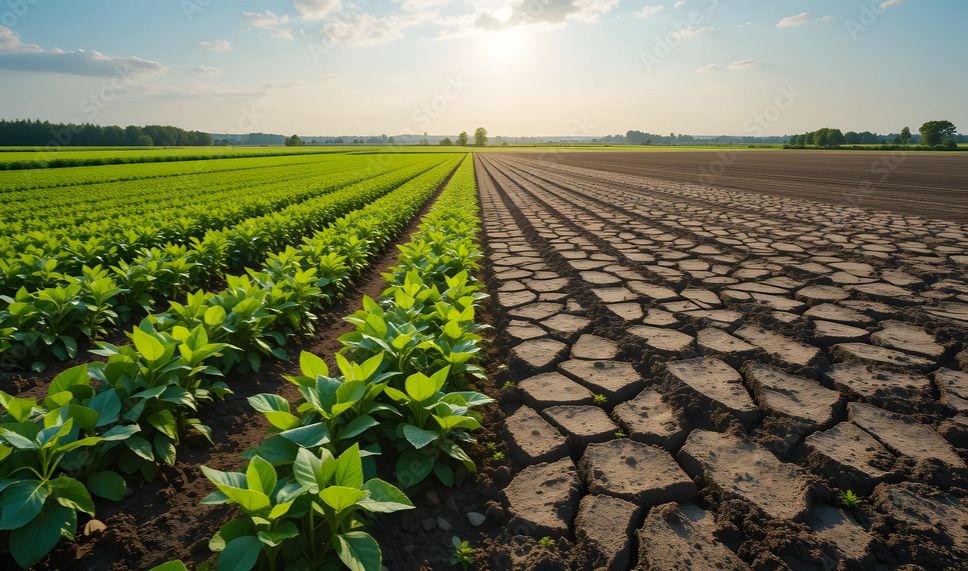NEWS

IN BRIEF

When climate change hit my home and our fields, destroying the standing crops, during the 2022 floods in Nowshera, it stopped being an abstract global issue – it became deeply personal. Like my family, countless others across Pakistan are facing the growing threat of extreme weather, which endangers not only livelihoods but our shared future. From scorched fields to submerged homes, farmers are on the frontlines of a crisis that demands more than policy responses; it calls for empathy, equity, and urgent climate-smart action rooted in resilience and collective responsibility. In this blog, Accountability Lab’s research intern, Momal Nawab, explores how climate-resilient farming, youth leadership, and inclusive policy reform can help shape a more sustainable future for Pakistan’s agriculture.
SHARE
In 2022, my maternal Aunt in Nowshera, Khyber Pakhtunkhwa, lived through one of the most devastating floods in the history of Pakistan. While their house, located a few miles from the river Kabul, withstood the rising waters, their fear of losing everything never left them. While it was distant from my everyday life here in Islamabad, the psychological weight of their experience shifted my perspective on the impacts of climate change on the lives of common Pakistanis. Climate crisis is no longer a faraway, abstract issue – it’s personal. It’s about people I deeply care about.
In Pakistan, extreme weather has become an everyday headline. For millions who depend on agriculture, this crisis is not just about the environment – it’s about survival.
Extreme Weather on the Rise
Over the past few years, Pakistan has experienced a wave of devastating climate shocks. The 2022 floods in Pakistan displaced nearly 33 million people, destroying homes, schools, infrastructure, and – most critically – vast stretches of agricultural land. In the years that followed, heatwaves in 2023 and 2024 scorched wheat fields across the country. More recently, hailstorms in Islamabad and Khyber Pakhtunkhwa have damaged crops, solar panels, and vehicles alike, leaving small farmers with little to harvest and even less hope.
This pattern of extreme, unpredictable weather is creating a climate of uncertainty. Farmers now sow their seeds with hope and harvest with anxiety, bracing themselves for the next heatwave, flood, or hailstorm.
Agriculture contributes nearly 20% of Pakistan’s GDP, and more than 40% of the labour force depends on it, which is severely affected by these changing weather patterns. The reliance on the weather has long been gone as the monsoon, once predictable, now arrives too early, too late, or with destructive intensity
Why is this Happening?
Pakistan is among the top ten countries most vulnerable to climate change, despite contributing less than 1% to global emissions. The key drivers of Pakistan’s agricultural crisis include frequent floods, erratic monsoon patterns, hailstorms, accelerated glacier melting, and ineffective water resource management. According to a 2024 report by Earth.org, Pakistan’s average temperature is rising faster than the global average, and if emissions remain unchecked, crop yields could drop by up to 18% in the coming decades.
While climate change is a global challenge, its impact is unequal. In Pakistan, the worst-hit are small-scale farmers, many without crop insurance, modern tools. or little support from the state.
Why This Matters Beyond the Farms
The agricultural sector is not just the backbone of our economy – it’s the bedrock of our food security. The failure of this sector can trigger a chain reaction, including food shortage, economic instability, unemployment, and rural-to-urban migration. While many of us living in the cities might feel that we are not being affected by the disasters, we are not immune. Climate change effects everyone – what we eat, how much we pay and the stability of our communities.
In conversations with my colleagues and peers, I often sense a disconnect from rural realities. Climate justice requires more than policies; it requires empathy, awareness, and shared responsibility.
What can be done?
There is no one-size-fits-all solution. But here are a few practical steps that can make a real difference.
- Local Climate Awareness Campaigns: Rural communities need accessible climate education. Leverage local platforms, community engagement, radio and TV programming, and weather updates in regional languages to build climate literacy.
- Youth Engagement and Climate Leadership: With over 60% of Pakistan’s population under 30, engaging youth in climate action is critical. This could be done through native climate fellowships and school initiatives that can empower youth to be the thought leaders. Initiatives like Native Youth Club for Climate Change are already empowering youth through fellowships and trainings. These local efforts require support for scaling.
- Promoting Climate-Smart Agriculture: The government must invest in climate-resilient farming techniques. This includes drought-resistant seeds, drip and sprinkler irrigation systems, solar-powered water pumps, and farmer training on digital tools.
- Policy Reforms with Equity at the Core: We need policies that centre smallholders. This includes smart early warning systems, investment in the research, digital literacy and affordable crop insurance
A Shared Future:
We often picture climate change and the crises it brings as something distant – melting glaciers, deforestation, forest fires, or the sinking islands. But in Pakistan, the crisis is already here – in our flooded fields, cracked soil and empty barns.
If we want a resilient, food-secured future and a thriving agricultural sector, the time to act is now. That means educating ourselves, supporting frontline communities, and ensuring that every solution is inclusive and just. Addressing climate challenges requires an urgent, coordinated response that places resilience, sustainability and justice at the core of Pakistan’s agricultural and climate strategies.
About the Author:
Momal Nawab is a research intern at Accountability Lab Pakistan, and can be reached at momal@accountabilitylab.org
